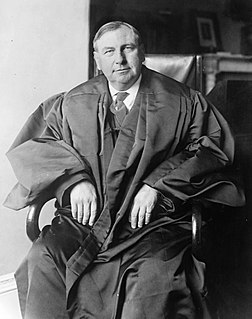A Quote by Harlan F. Stone
If a juror feels that the statute involved in any criminal offence is unfair, or that it infringes upon the defendant's natural god-given unalienable or constitutional rights, then it is his duty to affirm that the offending statute is really no law at all and that the violation of it is no crime at all, for no one is bound to obey an unjust law.
Related Quotes
The interesting thing is it's outside the statute of limitations for a civil suit by Leeds. It's actually is not outside of the statute of limitations under the criminal side. Because it occurred on an airplane and federal law doesn't have a statute of limitations I know off for that particular offense.
There has been no clearer principle of English or American constitutional law than that, in criminal cases, it is not only the power and duty of juries to judge what are the facts, what is the law, and what is the moral intent of the accused; but that it is also their power, and their primary and paramount duty, to judge the justice of the law, and to hold all laws invalid, that are, in their opinion, unjust or oppressive, and find all persons guiltless in violating, or resisting the execution of, such laws.
When it can be proved that the observance of Christmas, Whitsuntide, and other Popish festivals was ever instituted by a divine statute, we also will attend to them, but not till then. It is as much our duty to reject the traditions of men, as to observe the ordinances of the Lord. We ask concerning every rite and rubric, "Is this a law of the God of Jacob?" and if it be not clearly so, it is of no authority with us, who walk in Christian liberty.
The Supreme Court, or any court, when they make a decision, if that's a published
decision, it becomes virtually like a statute. Everybody is suppose to follow that law. Whether I decide to allow a law to become a law without my signature is simply
in effect expressing a view that while I don't particularly care for this, the Legislature passed it, it was an overwhelming.
vote, or maybe there were other reasons. But
my decision not to sign doesn't have to be followed by
everybody from that point on
































